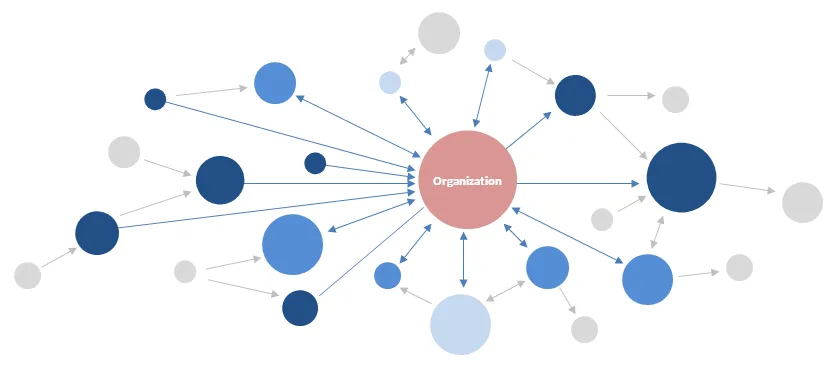Unintentionally, I have made use of the phrase "value network" very often in my recent posts. I coined the phrase from the idea of a "network that allows the free and fair flow of value between participants" in many ways, this applies to hive beginning with how the chain is governed to the social side of the network which also affects governance.
Value Network - Blockchain Case Study
Definition of value network from Investopedia:
A value network is a set of connections between organizations and/or individuals interacting with each other to benefit the entire group. A value network allows members to buy and sell products as well as share information. These networks can be visualized with a simple mapping tool showing nodes (members) and connectors (relationships).
In breakdown:
Value networks are connections between individuals or individuals and corporations in which their interactions benefit the group.
Members in a value network can buy and sell from one another as well as exchange important and relevant information.
Value networks can be depicted in mapping tools through nodes (members) and connectors (relationships).
The primary advantage of a value network includes the way a business or individual applies the resources, influence, and insight of their network connections.
Value networks help their members to grow value and consist of internal (e.g. research and development) and external (e.g. customers) resources.
Factoring in Blockchain:
If you read on you'd notice they additionally defined a value network as an economic ecosystem and we can relate this a bunch to blockchain technology.
A Blockchain is live when there are nodes sharing a copy of the ledger with each other. In real sense, the copies that get distributed are seen as "raw data" but when there's a community of users, consisting of investors, supporters, benefactors, and contributors, the raw data becomes value-added data, making blockchain a value network.
For the benefit of the entire group
This is where majorly many blockchains fall out of the category of value networks, without mentioning names, some blockchains are more of a capitalist type network than a value network thus the economies of these networks create value but doesn't feed the entire ecosystem.
On this basis, there are diverse utility structures that enable blockchains to create and distribute value, although not necessarily monetary incentives, the value has added advantage to network participants.
On the monetary aspects, blockchain games are a good example of value networks, with a game economy built to be fair to players that require individually applied strategies to earn, a system of proper value distribution is achieved.
DeFi also creates a fair earning environment for network participants. Everybody earns an equal sum for participating, thus the idea of being set up to benefit the entire group is true.
When we take things to NFTs, it can be a bit tricky, but as I've said before, not all blockchains fall into this category of value networks so definitely not all projects built on top of the technologies are either.
But there's an obvious NFT utility that would allow businesses and their customer base to qualify as a value network as the blockchain aids them access value through its technology.
Resources
The most underrated part of any sector is the services it provides that enhance access to "resources" and this is where we can see how Hive scales and is not given much credit for it.
Imagine a social rewarding platform built on Ethereum, obviously, it only becomes an environment that sucks up value from small accounts and feeds the larger ones.
On hive, the only thing one needs to scale is Resource Credits, which each account holds on creation, even though it's limited, it's enough for them to acquire a larger stake to earn enough resources from making the to right activities.
Consensus - Governance Protocols
As though the base layer is hugely dependent on the nature of the consensus system, a blockchain that should be categorized as a "value network" must pass the test of fair access to the governance and value of the base network.
Proof-of-stake(PoS) as we already doesn't qualify for this, thus all the blockchains based on it do not qualify.
And proof-of-work(PoW)?
I know, some would expect that I'd categorize Bitcoin as a value network. There are certain merits to the proof-of-work blockchain but it most definitely doesn't fit into this category.
I think calling proof of stake a money game and proof of work not is just hypocritical, cause what makes them different in that aspect?
The rich have an advantage in proof-of-work just as they have in proof-of-stake when it comes to producing blocks and earning rewards, there's nothing fair about both systems there, there are certain things that make Bitcoin secure but the cost of mining could be compared to that of buying expensive coins like Ethereum to become validator.
In the aspect of centralization, of course, Bitcoin passes the test, but easy access to the value it creates by the average? Not a chance.
Delegated-Proof-of-Stake
Once again, we can see how gaining access here only requires effort and not money!
On a network like hive, as a builder putting in the effort to develop applications that benefits the entire network, access to the rewards pool becomes as easy as ever, this is what makes Hive different.
You earn support for your efforts not your money, a true value network should be based on these principles, this is the only way the entire ecosystem can benefit from the value flow.
Thank you and please leave a comment, your thoughts matter to me
